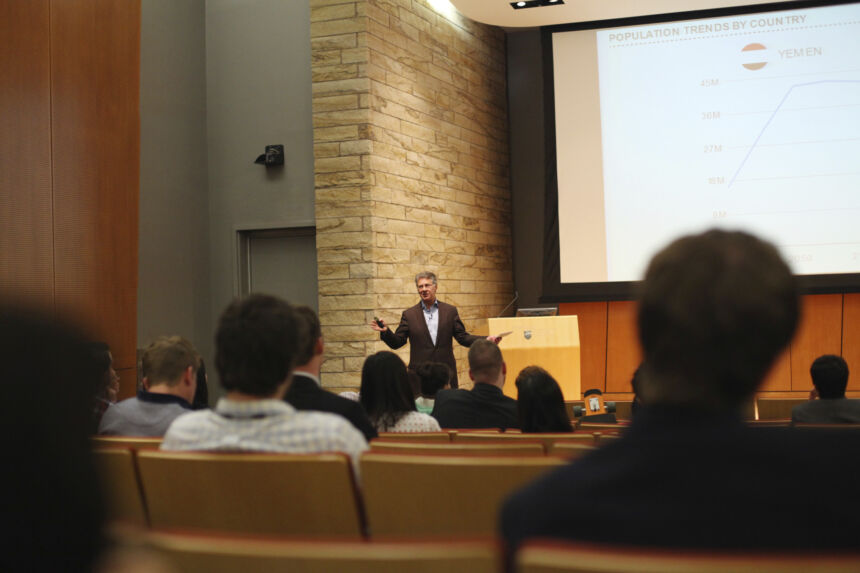May 04, 2015
Retired U.S. ambassador presents solutions to reduce rapid population growth

Retired U.S. Ambassador Karl Hofmann, a member of the Penn State School of International Affairs’ Advisory Board, spoke to SIA students and prospective students recently about challenges in global exponential population growth.
Hofmann, who also formerly served as executive secretary of the State Department, is now the president and chief executive officer of Population Services International, a Washington, D.C.-based global health organization creating and implementing solutions to reduce the world’s rapid population expansion.
Hofmann discussed some of the stark realities of world demography, fertility, and sustainability, displaying graphs showing the world population at 3.3 billion in 1965, jumping to the current number of 7.3 billion, and projected to explode to 10 billion by 2065.
“In my short lifetime, I can remember passing 4 billion and your children in 2065 are going to be confronted with a world that has 10 billion,” Hofmann said. “From your parents to your children, the world will have tripled in size and that’s compared to the whole history of humanity which took hundreds of years just to get to 3 billion.”
He explained that this demography has long-term effects, but reminded the audience that the numbers are simply projections.
Still, the projections are alarming. The projected population increase in that short amount of time will not be sustainable, especially in politically unstable countries. Because of this, nongovernmental organizations and nonprofits are working toward decreasing the exponential growth.
“Economies of each country need to maintain what is called the ‘demographic dividend,’ or the ability to absorb new citizens coming into the national economic system,” he said. “Countries need to train, educate, and employ citizens.”
Generally, countries with high fertility rates, also tend to be unstable countries, he explained. A geographical band of countries from Senegal to Pakistan have the highest fertility rates in the world.
Hofmann’s company and others are working on interventions in countries like Niger and other Sub-Saharan African states where large families are encouraged, but women have dangerous pregnancies, and mothers and children die during childbirth.
“We have implemented, and are working to increase implementation of, the concept of social franchising to allow countries to bring down the fertility rate without coercive means,” Hofmann said. “As part of this, social franchising, we’ve created family clinics to give women access to contraception, educate them on family planning, and change the socialization of a patriarch with many children.”
Social franchising is the application of the principles of commercial franchising to promote social benefit, instead of private profits. For example, an NGO implemented a franchise of family medical clinics in Niger to give medical care to children and families, which included family planning for women.
“By trying to reach women through education, family planning, and other services we see behavior change benefits,” he said. “Good things flow from this, where governments can then sustain and implement policies to educate, train, and employ the people.”
Education, training and employment also then lead to the greater possibility of political stability.
Hofmann finished his presentation by leaving the audience with a question, and an implied challenge to help this demographic issue.
“Which population trend and projection will be the one that wins?” he asked. “Which one would you rather have your kids see?”
In addition to serving as U.S. ambassador to Togo and executive secretary of the State Department, Hofmann also served on President Bill Clinton's National Security Council staff. He is the recipient of the State Department's Distinguished Honor Award, Superior Honors Awards, and Meritorious Honor Awards. He has worked extensively in Africa and the Caribbean, serving in Jamaica, Morocco, and Rwanda.
